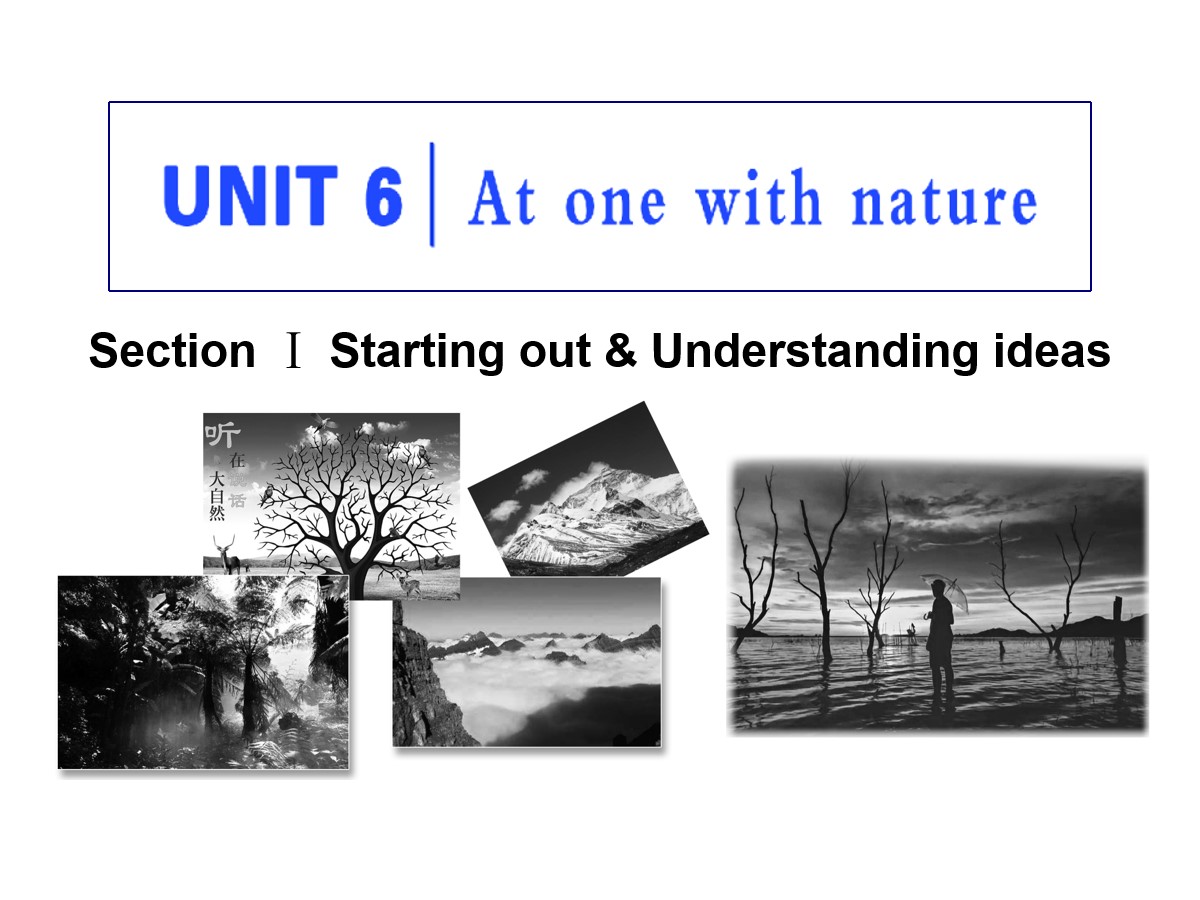《Into the wild》Section ⅡPPT课件
![]() 0
0
 《Into the wild》Section ⅡPPT课件
《Into the wild》Section ⅡPPT课件
《Into the wild》Section ⅡPPT课件
第一部分内容:语法精析
[探究发现]
1.The time when I first met Nelson Mandela was a very difficult period of my life.
2.The school where I studied for only two years was three kilometres away.
3.I don't know the reason why he came so late.
4.I will never forget the time that/which we spent in the park.
5.This is the factory that/which makes radio parts.
6.That's the reason that/which he explained to us.
[我的发现]
(1)句1中,关系副词when在定语从句中作 状语;
(2)句2中,关系副词where在定语从句中作 状语;
(3)句3中,关系副词why在定语从句中作 状语;
(4)句4,5,6中,先行词虽是表示时间、地点、原因的词,但在从句中充当 语或 语,而不是状语,故应用that/which。
... ... ...
Into the wild PPT,第二部分内容:要点规则详析
关系副词引导的定语从句
1.关系副词when引导定语从句时,先行词应是表示时间的名词,
关系词在从句中作时间状语。
I still remember the time when I first travelled by plane.
我仍然记得第一次坐飞机旅行的时候。
We will never forget the year when the 29th Olympic Games were held in Beijing.
我们将永远不会忘记第29届奥运会在北京举办的那一年。
2.关系副词where引导定语从句时,先行词应是表示地点或抽
象地点的名词,关系词在从句中作地点状语。
I'd like to live in the house where there is plenty of sunshine.
我喜欢住在那个阳光充足的房子里。
Finally, we got to a factory, where many mobile phones of high quality were produced.
最后,我们来到一家工厂,在那里许多高质量的手机被生产出来。
3.关系副词why引导定语从句时,先行词常常为reason,关系
词在从句中作原因状语。
Can you explain the reason why (=for which) you don't help him?
你能解释一下为什么不帮助他吗?
Can you tell me the reason why you didn't come to his birthday party?
你能告诉我你没参加他的生日会的原因吗?
[点津] 表示时间、地点及原因的名词作先行词时,定语从句可用关系代词引导,也可用关系副词引导。若先行词在定语从句中作状语,则应用关系副词;若先行词在定语从句中作主语或宾语,则应用关系代词。试比较:
Do you remember the days when we chatted with each other all night?
你还记得我们整夜聊天的那些日子吗?(when在从句中作状语)
Do you remember the days that/which we spent together on the farm?
你还记得我们在农场一起度过的那些日子吗?(that或which作spent的宾语)
I don't know the reason why he didn't turn to his good friend for help yesterday.
我不知道昨天他为什么没向他的好朋友求助。(why作原因状语)
I won't listen to the reason that/which you have given us.
我坚决不听你给我们的那个理由。(定语从句中缺少宾语,所以用which/that,不用why)
... ... ...
Into the wild PPT,第三部分内容:语境即时活用
In a promotional meeting, a company manager of the United States asked the participants to stand up and see what was under the seats.
It turned out that everyone discovered the money under the seat — at least a coin, at most 100 dollars.
The manager said, “These money will belong to you, but do you know the reason why I put the money under the seats?”
No one could guess why. At last the manager said, “I just want to tell you: sit still and you will never earn money.”
点评:第三段中的“do you know the reason why I put the money under the seats”为关系副词why引导的定语从句。当先行词为reason,且从句中缺少原因状语时,关系词应用why。
... ... ...
Into the wild PPT,第四部分内容:新知贯通
1.Learning idioms can be fun, especially when we compare them to Chinese equivalents.
学习习语是有趣的,尤其是当我们把它们和汉语中的说法
对比的时候。
★equivalent n.等同物;对应物 adj.(指在数量、价值、时间等方面)相同的
be equivalent to doing sth. 等同于做某事
①Mr Li's pay is the equivalent of about $8,000 a month.
李先生的报酬大约等于每月8 000美元。
②I changed my dollars for the equivalent amount in pounds.
我把美元兑换成等值的英镑。
③A dime is equivalent to 10 pennies.
十分硬币等于十便士。
2.people do what they want and have fun when someone in authority is absent
管事的不在,下面的人玩个痛快
★authority n.当权;权力;官方;当局;职权;权威
①The government is the highest authority in the country.
政府是国家的最高权力机构。
②Authorities say the fires do look suspicious.
官方表示,火灾看起来确实很奇怪。
③We see him as an authority on the subject.
我们把他看作为这方面的权威。
... ... ...
Into the wild PPT,第五部分内容:听力强化
一、听力技法微指导
推理计算,确定时间
听力测试中经常涉及时间的考查,此时,在听力材料中通常会出现多个时间信息。答题时应注意不要直接选取首次听到的时间词,而应把录音听完,注意其中隐含的时间信息词、时间状语或句子的时态。最终的答案通常是对这些信息进行分析推断,特别是经过简单计算后得出的。
二、话题场景词汇听中记(听写词汇)
(一)单词
1._____野生生物
2._____稀有的
3._____组织
4._____鲨鱼
5._____昆虫
6._____生态,生态学
7._____物种
8._____保护
(二)短语
1.rare_____稀有物种
2._____of smell嗅觉
3.breathing _____呼吸系统
4.suitable _____合适的环境
5._____changes 环境变化
6._____condition 天气状况
7._____patterns 迁徙模式
... ... ...
《Into the wild》单元要点回扣PPT 第一部分内容:Ⅰ 重点单词 重点词汇夯实练 1.①It is hard ______________ (measure) his ability when we havent seen his work. ②It is high t..
《Into the wild》Section ⅢPPT下载 第一部分内容:专项突破 定语从句(2) 课堂要点精析 定语从句除了由关系代词引导外,还可由关系副词when, where, why引导,它们在从句中作状语。 ..
《Into the wild》Section ⅡPPT下载 第一部分内容:重点单词 基础词汇 1._____________ n. 当权,权力 2. _____________ n. 意外地遇见,与邂逅 3. _____________ n. 基本部分,要素..
















 关于我们
关于我们 备案号:冀ICP备18037400号-20
备案号:冀ICP备18037400号-20